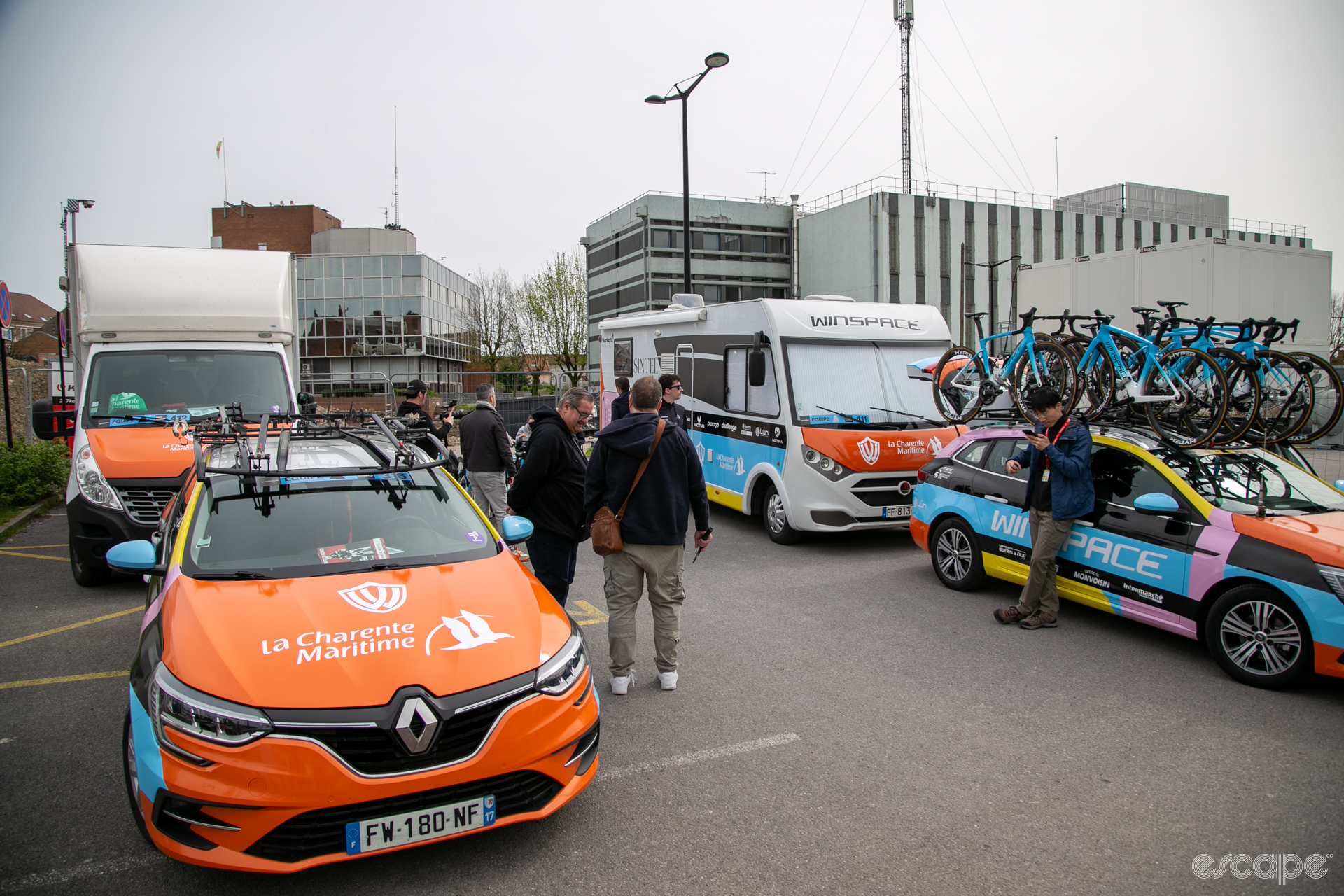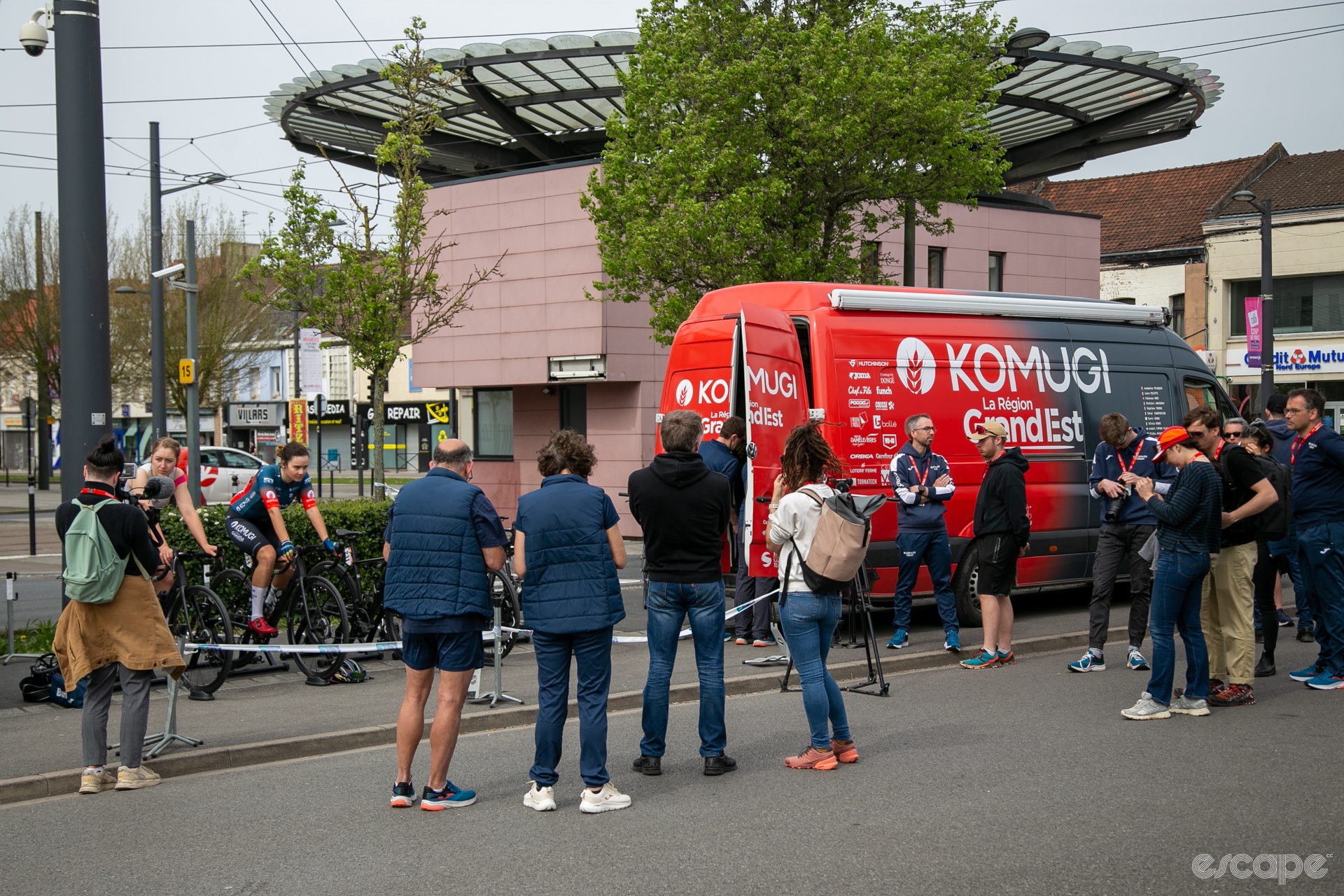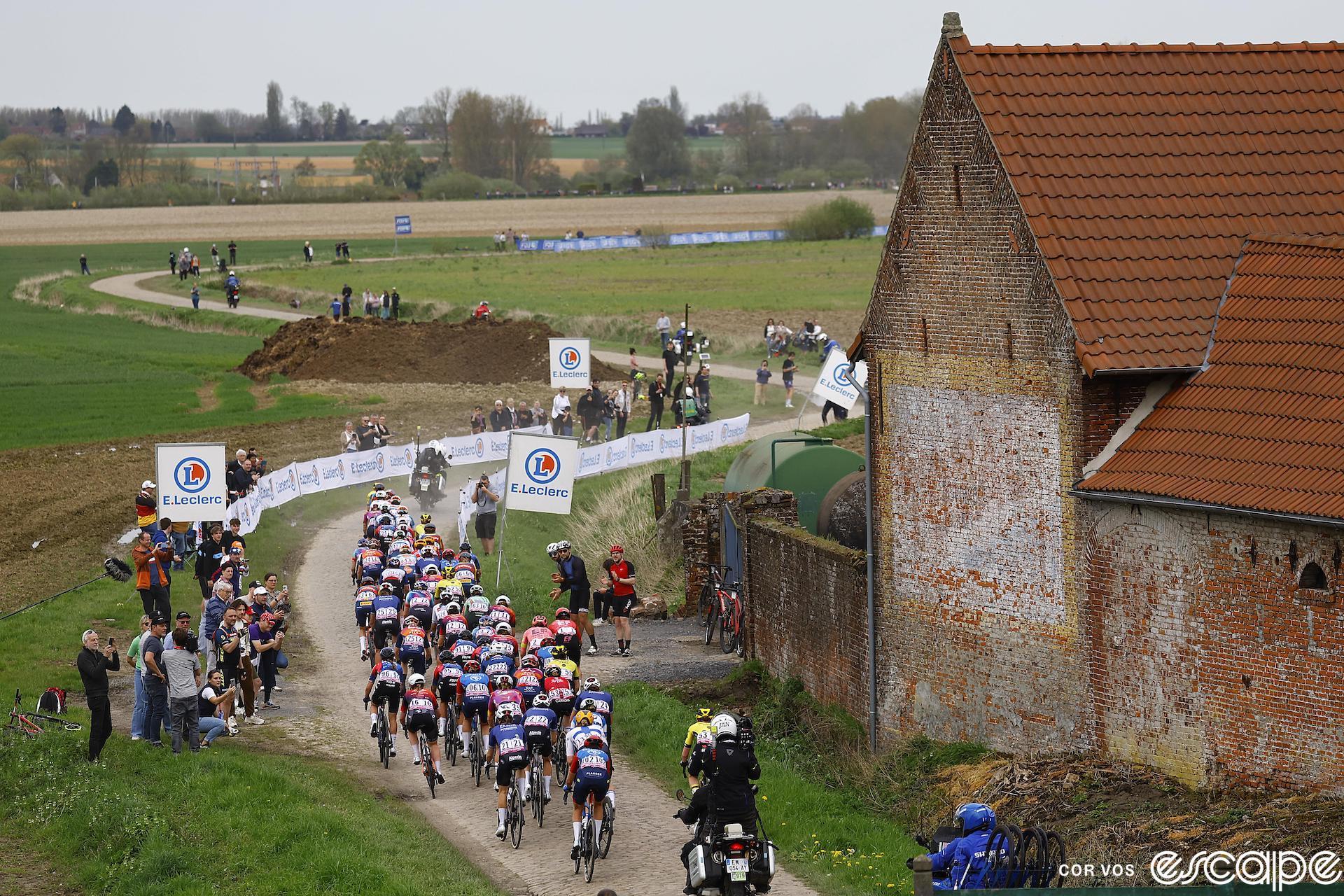Back behind the fancy team buses at the end of a parking lot in Denain two cycling teams prepare for one of the biggest bike races of the season: Paris-Roubaix Femmes avec Zwift. Neither Winspace nor Komugi-Grand Est have scores of fans circling their pre-race setups; everyone is too busy waiting outside the mega buses of SD Worx-Protime and Lidl-Trek hoping to glimpse current and former World Champions.
While EF Education-Cannondale, home of 2023 Paris-Roubaix Femmes winner Alison Jackson, is fending off journalists, these two Continental teams, one French and one Dutch, quietly wait for the chaos to start. Their goals aren’t lofty, they do not have a plan to win the race. It’s a tactic of survival, gaining experience, and enjoying the moment for these women on Saturday.
“It’s going to be a hard race,” Komugi director Lucas Leblond told Escape Collective before the race. “We expect it to be really hard, really tough, but we expect the girls will go for a breakaway to show themselves at the front.”

In a race where almost everything is about timing and positioning, even the top teams struggle to come up with a plan to win. Every bike race has an element of disorder; there is only so much a team or rider can control. And Paris-Roubaix Femmes is not like every other bike race. It is a day as uncontrollable as the weather.
But even with that turbulent nature, even as a team with little hope of a podium, every team needs to line up with a goal in mind. For these small teams the goal is simple: try to get in a breakaway and fight like hell.
”To be active in the race we know that we are not as strong as the other girls, so if we fight at the same time it’s going to be really hard and we cannot follow, so we aim to anticipate,” Leblond explained. “That’s the only strategy we can have.”

”Of course, for a team like us it’s a key point to be in the breakaway, but with last year the breakaway going really far, maybe today it will be really different,” said Jeremy Bellicaud, director for Winspace. “We will watch out for crashes and the changing direction with a lot of wind today.”
In other races, even the bigger ones like the Tour of Flanders, getting into an early break isn’t out of the question for a smaller team. Most of the time, before the live coverage ticks on, riders from VolkerWessels, Coop-Repsol, and other Continental teams have thrown their energy toward animating the opening stages.

But Jackson’s early attack and subsequent victory last year made the early breakaway the hottest place to be.
”We know that in Paris-Roubaix it can work, so everyone is taking care of the breakaway, especially because last year it worked, so we know the big teams will be attentive,” Leblond said.
“The wind is not favourable to our strategy, but that’s the only one we can have so we are going for this.”
Aside from focusing on staying upright, the only other goal for these riders and teams is to get ahead of the race, to hopefully get their jerseys on television.
”I think for us km 30 or 31 is a key point, I think for every [other] team also, so just to arrive in a good position to this point, and just to arrive on the cobbles in a good position,” Bellicaud said. “After that, the cobbles make the job and make the race.”
This early point of the race, still halfway to the first cobbled sector, is when the peloton will start to prepare to do a 180 and head north towards the cobbles. The wind was a major talking point ahead of the race; if Jackson popularizing the early move doesn’t kill the chances of there actually being a breakaway, the wind will finish it off.
”For us, if we can have at least one girl in a breakaway it’s really good,” Leblond said. “If they can manage to be in the bunch to finish, and if we don’t break too much, that’s fine too.”
If the breakaway is out of the question, and the win is out of reach, staying upright and unharmed is the best possible outcome of Paris-Roubaix Femmes. Only 25 km into the race there were already multiple crashes, including one involving Jackson and another one involving her EF Education-Cannondale teammate Coryn Labecki, winner of the Tour of Flanders in 2017.
The crashes in the bunch did allow a rider to slip up the road, but it didn’t last long.
Almost immediately when the flag dropped on Saturday attacks flew. The first rider to get a good advantage was Victoria Joncheray of Komugi-Grand Est. Her gap grew to two minutes almost immediately, but as the peloton approached the turn northward it plummeted. She was caught with 110 km still to go, well before the first cobbled sector.
With 29 km to go until the first round of pavé the peloton was all together, the race reset, and the riders of Winspace and Komugi-Grand Est still – theoretically – with a fighting chance.
“Girls fighting in the final, we don’t know what can happen, it’s a different race and everything can happen, so for us it’s not like a result but fighting all day long,” Bellicaud said of Winspace’s goals for the day.
In a race where anything can happen, even the smallest teams can have success. That might not be the top step of the podium, it might not even be the top 10. Instead, something like Joncheray’s original brave attack, or Winspace’s neo-pro Xin Tang finishing inside the time cut are the small victories they’ll take home, but at the end of the day they can still say they raced Paris-Roubaix Femmes, one of the most exciting bike races in the world.
What did you think of this story?

